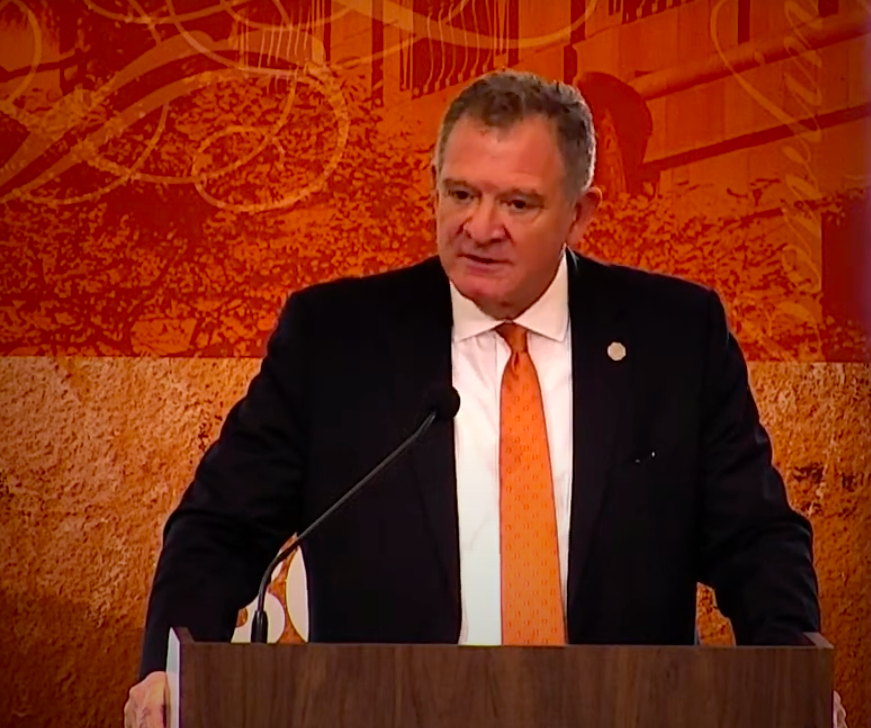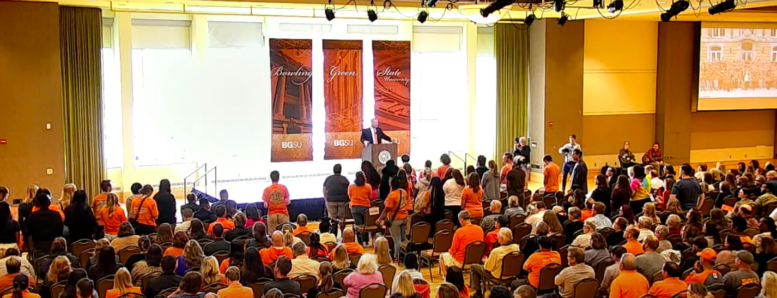By DAVID DUPONT
BG Independent News
On the eve of the Marching Forward Homecoming, BGSU President Rodney Rogers declared Wednesday the state of the university as “very strong indeed.”
That strength, though, will be tested as higher education faces “heavy head winds.”
While BGSU is experiencing enrollment growth, a “demographic cliff” where fewer and fewer students are graduating from high school looms.

Our work matters. Our research, discoveries, our economic impact, our partnerships, dialogues, academic programs and opportunities we provide our students absolutely matter.”
BGSU President Rodney Rogers in 2023 State of the University address
And public confidence in higher education is low. He reported that a Gallup poll found only 36% of those asked had confidence in higher education. That’s down from 57% in 2015.
While higher education has support from Governor DeWine, those in his administration and some legislators, including State Rep. Haraz Ghanbari who was in attendance at the Grand Ballroom in the Bowen-Thompson Student Union, some legislators will push bills and courts will make rulings that “will shape what we do,” Rogers said. “The rhetoric is getting louder.”
BGSU will “hold on to what we’ve always been: a public university for the public good,” he promised.
That’s needed more than ever.
“We must work relentlessly to redefine student success,” he said. Always helping students develop “their ability to be resilient, to think critically and creatively, to under the importance of participating in our democracy, to vote. It starts with voting.”
BGSU is banking on its new Life Design program, which Rogers called “ a holistic approach to student success in career and in life,” to help achieve this and o set it apart in the higher education marketplace.
[RELATED: BGSU goes all in on Life Design]
BGSU and higher education must, he continued, “demonstrate the importance and relevance of research and the importance and relevance of rational inquiry to improve the human condition. That is our work that we need to do every day.”
In its 113 years of existence, BGSU has faced troubling times, Rogers noted: two world wars, social upheaval, and two pandemics.
When the coronavirus pandemic emerged, critics questioned why a comprehensive, residential university would stay open.
BGSU was open, Rogers said, because higher education is essential to society.
During that time, BGSU continued with the initiatives in the works. It opened a School of Nursing, expanded the aviation program, “reimagined” applied engineering, laid the groundwork for a hybrid Doctor of Physical Therapy, and started recreation and attraction management major at Firelands.
“These were programs that our society needed,” Rogers said.
The university also completed a successful comprehensive fundraising campaign that topped its goal of $200 million by $55 million.
But coming out of the pandemic, tragedy struck when sophomore Stone Foltz died of alcohol poisoning as a result of a hazing incident.
The issue is pervasive, he said. “We stepped up, hosting Ohio’s first anti-hazing summit, and led statewide effort to eradicate hazing and creating a culture of reporting and accountability,” he said.
“I am proud that we have not and will not shy away from our share commitment to investigate any allegations that threaten safety even if it might impact a high-profile program.”
The last phrase was a veiled reference to news from the day before that the university had placed three hockey players and the coach on leave as it investigated a report of hazing.
“We will do the right thing even if it’s a hard thing,” Rogers said.
In the face of the upheaval following the death of George Floyd, they held a Title IX conference, launched the Beyond the Dream speaker series, and introduced the first diversity and belonging comprehensive plan.
BGSU also honored its history as a pioneer in ethnic studies by naming the veranda of Shatzel Hall for Robert Perry, a founder of the ethnic studies department and a proponent of having all students take a required ethnic studies course.
[RELATED: Ethnic studies trailblazer Robert Perry’s work continues at BGSU]
This is a time, he said, when education is “undervalued and under invested in” the university community has “forged forward together.”
“Our work matters,” he said. “Our research, discoveries, our economic impact, our partnerships, dialogues, academic programs and opportunities we provide our students absolutely matter.”
The university, he said, must focus on efficiency and effectiveness, not like some peer institutions to plug budget deficits, but to maintain “a growth mindset” in a challenging time.
The university will focus on building on its success on enrolling more students, retaining them, and then seeing them through graduation.
Rogers framed the address around the story of Bob Thompson who came to BGSU on a football scholarship from a small farming community in Michigan in 1950. The first in his family to attend college.
He was injured early in his time here. He expected he’d have to leave school. He could only afford to stay if he had the athletic scholarship.
But his coach, Rogers said, saw to it that Thompson could stay.
Thompson met his wife, Ellen Bowen, at BGSU and graduated. He went on to own a successful business. He’s returned that coach’s favor by becoming the largest donor to BGSU. The student union is named for Thompson and his Falcon flame.
The Thompson Family scholarships help students from working class families, those with military connections, and members of the Ribeau Leadership Academy.
More than 1,000 students receive Thompson scholarships, which pay almost the entire cost of a BGSU education, and Rogers said in the fall there will be “exciting, transformational news.”
Rogers said that “the Thompson expressed their intent to significant expand and extend the scholarship program into the next decade. We anticipate this will impact more than 4,000 students.”
These are students who otherwise would not be able attend college, “people who will go out and be our future leaders.”
All this goes back to one coach, Rogers said, “going the extra mile for that one student.”

